Beetlestone Award, previous winners
2024 Award - Sarah Bearchell

I was delighted and amazed to win the Beetlestone Award, particularly because I almost didn’t apply!
I’m a freelancer, mainly creating science shows and workshops for schools and festivals. I happened upon my niche by chance, when the head of a local special needs school asked me to work with her pupils. I knew many of the children already, so was able to create science activities which really engaged them with learning. And those same activities were a huge success whether I took them to a mainstream primary or a science festival.
I now create all my new sessions with special needs school students in mind. This ensures the activities are multi-sensory and participatory, leading to greater engagement for everyone who arrives at one of my sessions. Interest in Inclusive Science is rising, and I’m proud to be part of that by offering training and advice to institutions as they create new activities for broader audiences.
If you are thinking of applying for the Beetlestone Award, then you definitely should. The process made me take an objective look at my career; it helped me to identify the most fulfilling parts of my portfolio, but also those areas not working for me. It also gave me a fresh perspective on my work, which I am reminded of every time I glance at the beautiful trophy.
2023 Award - Lewis Hou
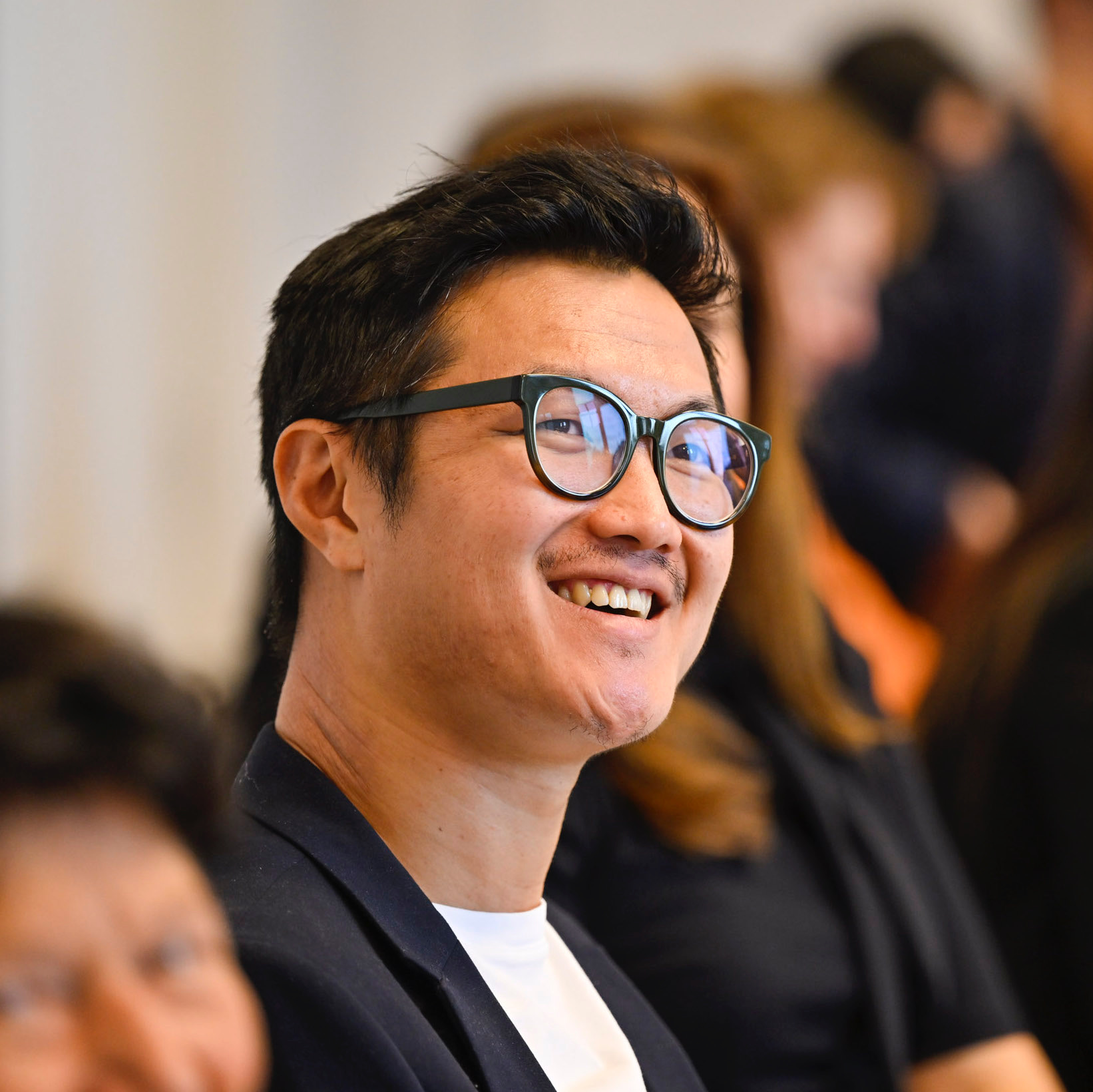
I am honoured and feel very privileged to have been awarded the Beetlestone Award. For me, this is a wider recognition of the importance of community-led science engagement which supports more diverse voices to be more involved in research, as well as the more immediate recognition of the brilliant Science Ceilidh team, supporters and partners.
This feels like a full circle moment as it was the BIG community who were such a fundamental part of when I started to freelance in science communication, finding my own voice in this work. It was heading to my first BIG event in Glasgow 2013 where on the train there I penned my first song “Fiddling in the Brain” which - whilst not winning the BIG Demo competition - became the beginning of a school workshop I developed in Orkney where the seeds of Science Ceilidh started.
As I developed my own practice, it was the BIG Event where I could hone and share my experience contributing to sessions around evaluation, youth-led programmes, inclusion and diversity, and of course, a few impromptu science-themed ceilidhs - where I developed the friends, colleagues and the support network needed to take the plunge and set up Science Ceilidh as a social enterprise in 2016.
Our school programme still honours our science-arts beginning - supporting programmes, resources and teacher training using transdisciplinary approaches across traditional Scottish arts, STEM and wellbeing, and we still host the occasional ceilidh. So much else has changed with our work developing into a much broader mission as an organisation: “supporting a Scotland where everyone’s creativity, curiosity and wellbeing are valued”
Our partnerships and programmes with the cultural sector, including organisations such as the Fun Palaces campaign, Creative Lives and the Scottish Libraries and Information taught us it was important not to tokenise the arts in service of science engagement but that our work is to support culture for it’s own intrinsic value. This has enabled for us a deeper way of working and building relationships with different community groups - from rural communities to New Scots with refugee and asylum seeker backgrounds, where our long-term programmes are more focused on inclusive community learning and development.
These experiences led to our most recent focus of work, partnering with the British Science Association as well as our Curiosity In Action programme, designing and supporting the funding of around £1.3 million pounds to over 35 underrepresented communities directly across Scotland to lead engagement themselves around climate change, mental wellbeing, youthwork and culture. Through this we have identified and navigated many of the systemic challenges to more equitable science engagement - from how to make funding more sustainable and participatory, to the importance of trusted intermediaries - the people, organisations and networks who can broker relationships, build connectivity and share knowledge in ways that values everyone’s perspectives and expertise.
Which brings me full circle to the BIG community and recognising how important spaces, networks and communities like this are to the ecosystem around science engagement, and how honoured I am to be part of it.
With the Beetlestone Award comes the opportunity for me to host something that would hopefully be of longer-lasting value to the sector. Recognising the current challenges in the sector are systemic, I’m proposing to host a conversation involving both decision-makers, community members as well as practitioners, to explore and reimagine what science engagement could look like collaboratively in the current climate from a systems perspective, so we can design together a sector which embeds equity and diversity, and centres both communities and practitioners - the science communicators - more in this work. I’m looking forward to that conversation. For those of you thinking of applying for the award, do it! Thank you once again for the recognition, and see you at BIG!
2022 Award - Karen Davies
.JPG)
Receiving the Beetlestone award has been an honour and it has made me reflect on the journey I have been on in this sector. I have relished the many opportunities I have had and the numerous people I have met, who not only expanded my thinking but disrupted it too.
I have two passions linked to this award: (i) improving the quality of visitors’ science experience and (ii) ensuring that those less confident and comfortable with science feel that museums and science centres are places for them. This work has ranged from exhibition development to training museum professionals and scientists in audience engagement … from audience research and advocacy to working with academic partners on large-scale learning projects.
Recent insightful learning projects have included Early Years science engagement through embodied learning and play, as well as science capital work, a game-changer in its focus on equity and social justice.
The Enterprising Science partnership programme with UCL and King’s College to proof the science capital concept, made us (the Science Museum Group) think hard about how to effectively translate that research not only for ourselves but in a way that is useful for practitioners in the informal learning sector. In this respect I want to acknowledge my team for the amazing work they all do, in sharing what we’ve learnt about putting ‘science capital research into our own practice’ … both nationally and internationally. We have learnt a lot together.
In my musings it is clear to me how committed this sector is to trying new and different ways to engage a broader range of people in science, and this type of shared learning (what didn’t work being as crucial as what’s works) is what moves us all forwards.
All of our organisations from the top down to the bottom up, have the power to change the environment we invite audiences into. It isn’t about changing those audiences it is about changing ‘us’, and this isn’t just down to the Learning team within organisations. Everyone has a role to play.
I hope the sector continues to create more ‘communities of good practice’, where sharing lessons learned (including the things that don’t work), becomes the norm. Where staff across departments recognise the vital role they play in supporting the delivery of engaging, inspiring and memorable experiences that are inclusive.
At its heart, this work is about ‘changing and building on our practice’ to prioritise the needs of excluded groups, or people who don’t currently see science centres and museums as for them, using the science capital concept and wider education research, through a cycle of iterative reflection. No one organisation can change the status quo … but we will make a difference together. I look forward to the learning journey ahead…

2021 Award - Fran Balkwill
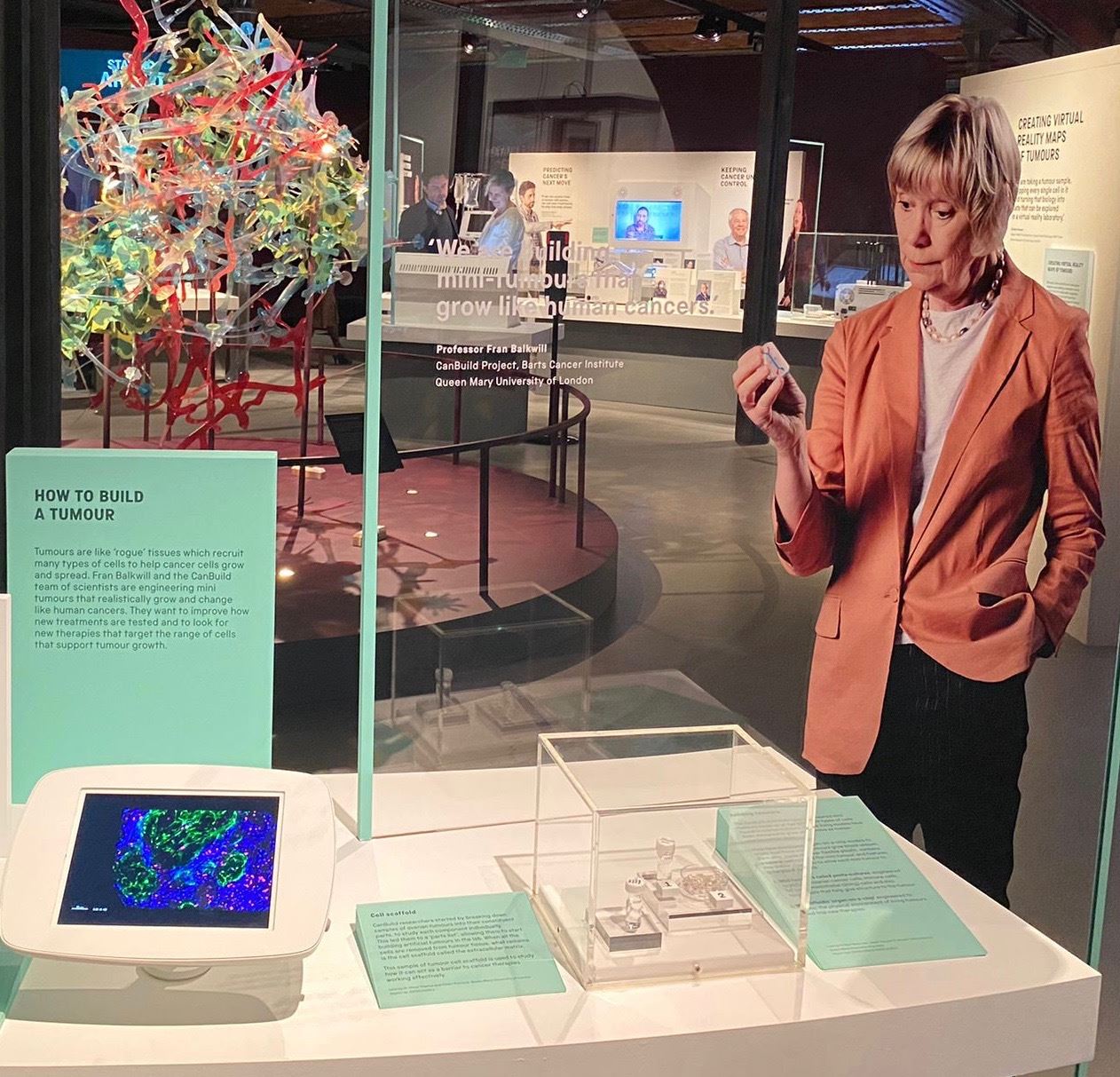
It was a huge honour to receive the 2021 Beetlestone Award. I see it as not only a personal
recognition for my contribution to science learning but also an award for all the brilliant people who have worked with Centre of the Cell over the past 15 years as well as a recognition of Queen Mary University of London who have supported the project in so many ways from the beginning.
I have been extremely privileged to have had two synergistic and concurrent careers, one as
a cancer researcher and the other as a science communicator, especially as Director of
Centre of the Cell since its inception. This past year has not been easy for informal science
learning centres and Centre of the Cell was no exception. The Beetlestone Award was a
great boost to team morale and also very important in terms of our internal and external
profile and fundraising.
We first opened Centre of the Cell in 2009 and, to the best of our knowledge, it was the first
informal science learning centre to be based in a biomedical research building. The
innovative design of the Blizard Institute at Queen Mary, with its vast subterranean
laboratory floor, means that Centre of the Cell’s ‘STEM Pod’ is suspended above scientists at
work. The immersive Pod experience, a five-scene theatrical mixture of film, digital
interactives and objects on loan from Barts Pathology Museum, was an award-winning
success from the start. After 12 years and 217,000+ participants, Centre of the Cell now also
offers sixteen original presenter-led science shows and workshops, all linked to the
curriculum and delivered on site or via outreach to schools and communities, covering all
ages and stages from 4 to 19. As we are part of the university, we access cutting-edge
science content on which to base our activities. Many of these are funded by components of
research grants, and some even contribute to the recruitment to research studies, such as
Genes and Health (http://www.genesandhealth.org/) and CHILL (Children’s Health in
London and Luton https://www.qmul.ac.uk/chill/).
We also have a Youth Member Scheme, YMS, that offers work experience and volunteering,
careers advice and workshops, study and revision support, an intensive summer school and
opportunities to participate in developing new activities or designing research projects, and
a science book club. In 2019 we opened a second learning space, Neuron Pod, with external
multi-coloured dendrites that light up the Whitechapel streets each evening.
I am pleased to say that since we re-opened earlier this year, our young visitors and their
teachers, parents and carers have returned and their enjoyment and interest in biomedical
science seems greater than ever. We also have a number of new initiatives underway for
2022 and are also looking forward to taking our YMS members to see the Cancer Revolution
exhibition https://www.scienceandindustrymuseum.org.uk/whats-on/cancer-revolution,
when it arrives in South Kensington in May 2022 (see attached picture).
With the health challenges we now face, and not just with Covid, I believe that projects such
as Centre of the Cell, are critical to inspiring the next generation of scientists and health
professionals. The Beetlestone Award strengthens my resolve, and that of the Team, to
work even harder and increase the science capital of more young people.

2020 Award - Bridget Holligan
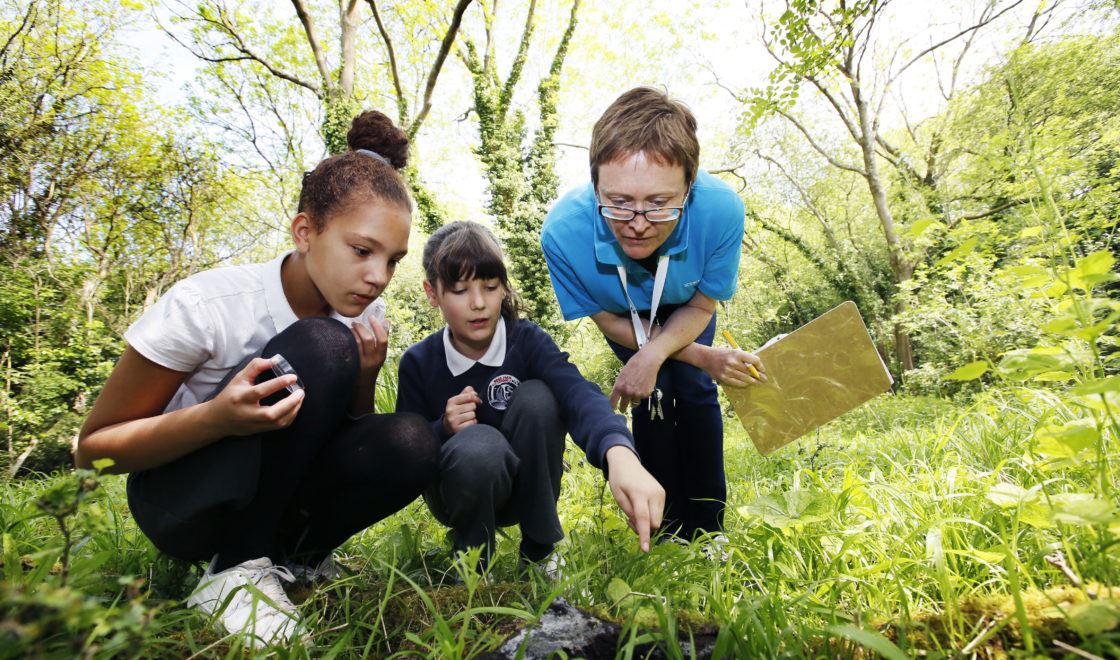
I’m honoured to receive this Award and it means a great deal to me, more than words can say really, to be recognised by my esteemed peers from the field of Informal Science Learning (ISL). The award itself is a very beautiful glass object, designed by Harry White, with an internal 3D engraving of an ‘Impossible Triangle’ – something which has also been the inspiration for hands-on science exhibits about perception, and you need to rotate the glass to fully appreciate the beauty of the design. I have worked in the ISL sector all my career, since I took my first steps working at the Exploratory science centre in Bristol in the early 90’s, and I am lucky enough to have met John Beetlestone when he was Director of Techniquest. Techniquest was one of the first science centres that I visited and his vision was an early influence on my philosophy and direction of travel. I was only sorry that we couldn’t be all together at Techniquest, as originally planned for the BIG Event, as it would obviously have been the perfect setting. However the online format meant that Wendy Beetlestone was able to join us from the US and it felt very special to be able to accept this award from John’s daughter.
It’s also a great delight to me that the Beetlestone Award is administered by BIG. I’ve been part of BIG since it began and it is the most important professional network that I have been part of as an individual. The creative and nimble ‘by members, for members’ ethos is so special and for me BIG exemplifies what is so fantastic about our ISL sector.
It’s been a privilege and a career-long dream to have had the opportunity to create a new small science centre founded on my own evidence-based practice with Thinking, Doing, Talking Science. One of the things that I love about the ISL sector is that we are so willing to be critically self-reflective and to share with each other. Perhaps it’s that magic combination of caring about what we do, why we do it and the impact that we have as well as our scientific mind-set – and in this way we hone our craft and develop expertise. One area where I feel we can really take a lead is in exemplifying what best “science capital practice” looks like, both in the moment and as a journey and I’m really looking forward to continuing, with many others in the BIG network, to being part of that endeavour.

2019 Award - Helen Featherstone
.jpg)
Winning a Beetlestone Award is an honour that means a lot to me - but why do I do feel that so strongly?
Putting together my application was a useful opportunity to create a joined up story about lots of different aspects of my work over the last 20+ years. I have long described myself as being interested in the people in public engagement, writing the application helped me deepen my understanding of what I mean by that phrase.
Our sector is nothing without its people, but our people are often overshadowed by the projects and activities they deliver, the institutions they work in, and funders who provide the financial resource. I want to ensure that our sector is a place where all people can thrive. The application didn’t just give me a chance to reflect on what I’d done it helped me to consider the future and what still needs to be done.
Winning the award provided the external recognition that what I’ve been doing has value and therefore gave me permission to keep on with my commitment to sector development. The year I was awarded the Beetlestone was also the year that BIG members voted for BIG to take on more of an advocacy role for its members. I had been Chair of BIG for one year at this time and was delighted that BIG members wanted recognition and support and that the Exec could deliver on that. I was re-elected in both 2019 and 2020, on both occasions with a mandate for advocacy and sector development.
The more I listen to, and talk with, the people in our community the more I realise how little we know. Take volunteering. Many of us volunteer, but we don’t currently know how much volunteering happens, and what type of work is undertaken in a voluntary capacity. We know that volunteering is something many coming into our sector don’t have the privilege to commit to so this creates an unequal and unjust sector which I’d like to address.
Another unknown is about those who devise and deliver training. Many of us do it but again, we don’t how many, who they are training, or what content they are delivering. How do we know if the training is effective? What if trainers are passing on misconceptions or outdated ideas?
At an institutional level, getting the Award raised my profile within the University. The internal communications team put it on the home page and I had several folk get in touch with their congratulations. Having external validation of you and your work is no bad thing in a large organisation where it is easy to lose profile, especially when what you do isn’t core business. Reminding the senior team that they’ve someone good is useful.
It was personally and professionally satisfying to win a Beetlestone Award and has certainly been a prompt for further action which will continue for years to come.

2019 Award – Ian Russell
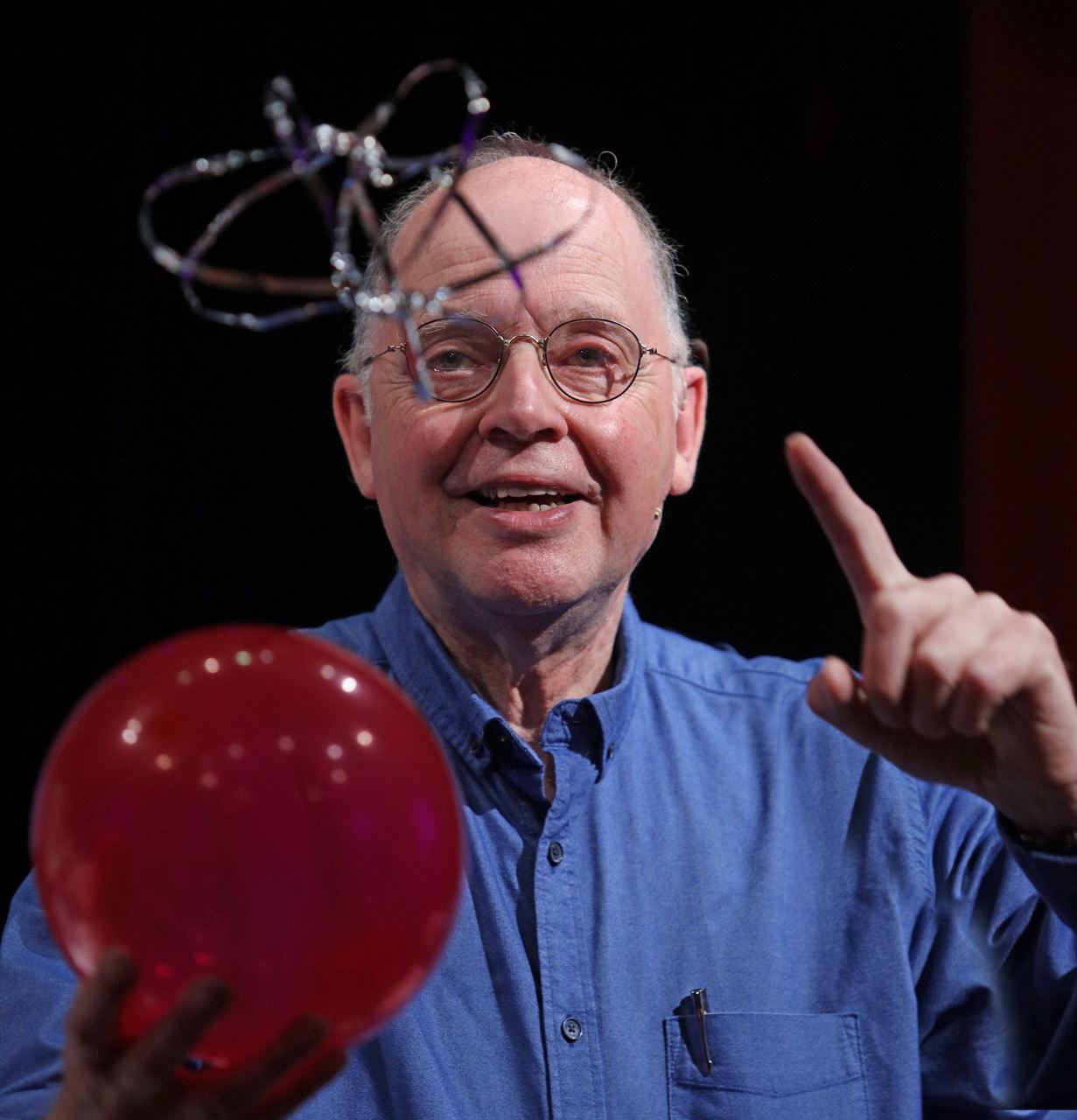
Receiving the 2019 Beetlestone Award has meant so much to me! Working independently for well over thirty years as a SciComm ‘freelancer’ sometimes seemed a little lonely, despite the priceless support of dear friends and colleagues through professional networks such as BIG. To be recognised among my peers in this way is an honour that has encouraged and motivated me to keep going!
I have always advocated a sensitive ‘hearts-on’ approach to science communication. Passionately concerned that heavy-handed didacticism should not be allowed to crush bright-eyed, playful curiosity, I have had countless intense discussions about the necessary balance between explanation and exploration…
This public acknowledgement of my ‘legacy’ is also helping me to make potential clients aware of my experience. Having become one of the older members of our community, I find myself surrounded by younger newcomers to the field. It is wonderful to see so much fresh talent and innovation - and sometimes also painful to observe people learning from the same mistakes I made!
When I began as a science show performer and designer-producer of interactive exhibits it was early days and there were few of us doing such work. We felt like pioneering ‘wonder-smiths’. Now it is becoming commercial. The experiences I create are dealt with as commodities and I am sometimes made to feel more like a tradesman. However, effective SciComm will always be more about people than about projects and price-tags. What a privilege, to be part of this lively community of communicators!

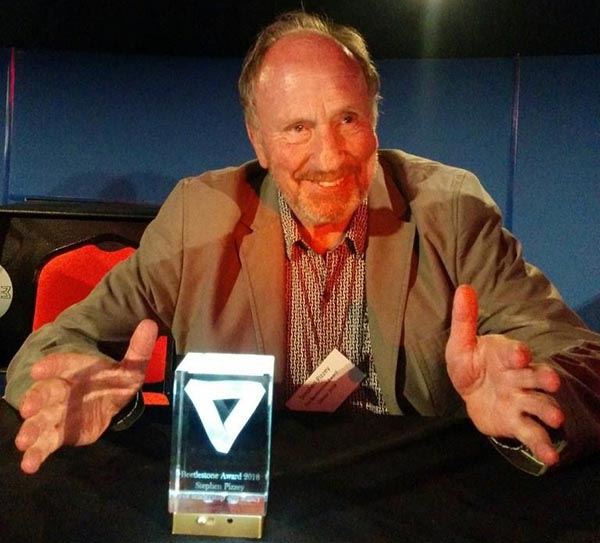
2018 Award - Stephen Pizzey
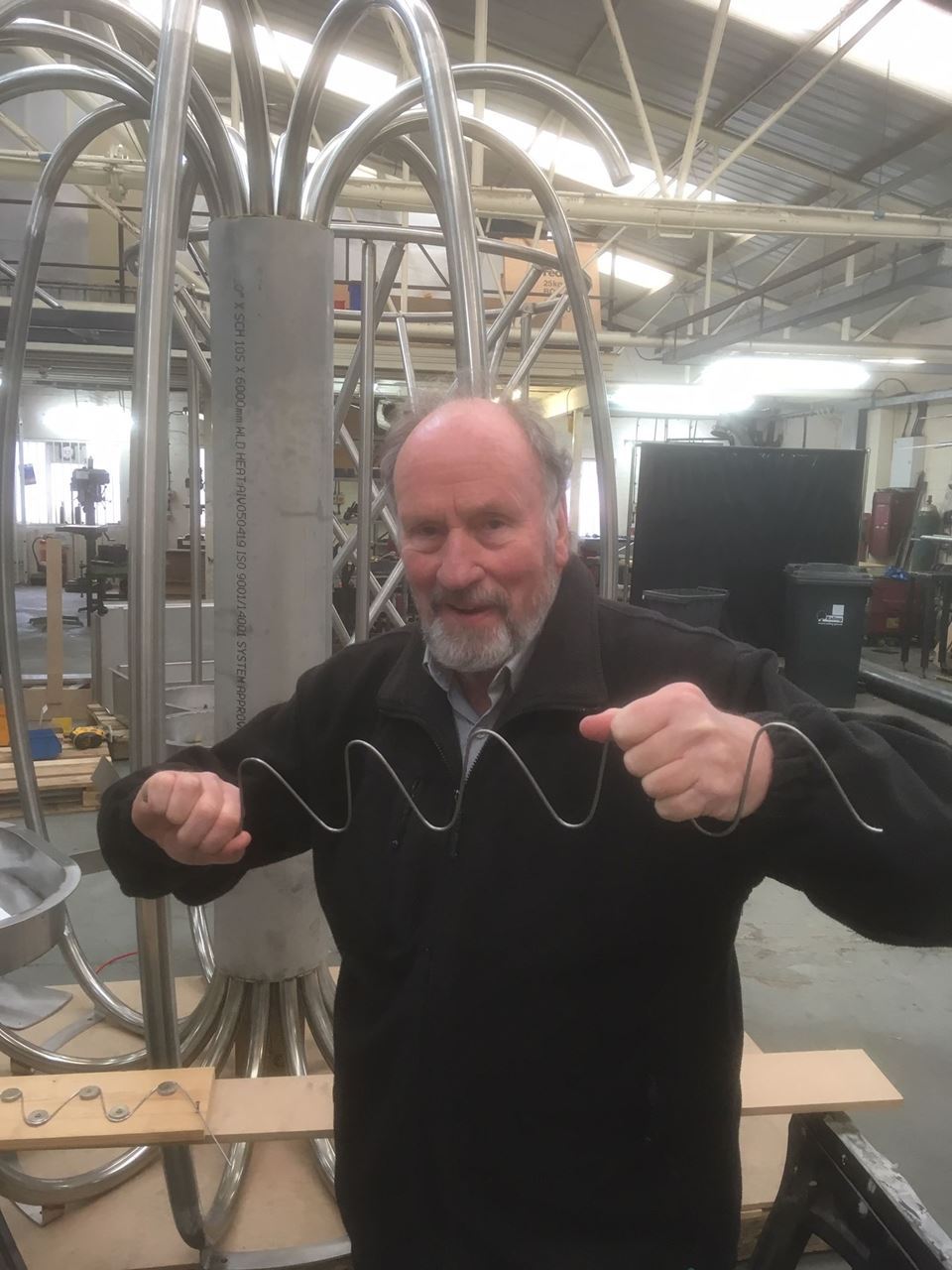 As the first ‘Beetlestonian’ I thought I would write a few words on how the year has gone so far. The award has had a profound effect on what I have done and will do. First, the origin of the award through the family has given me a chance to think back on Professor Beetlestone’s achievement in the field and the mood of adventure that prevailed as the UK hands-on scene blossomed in the pre Lottery Grant days. My own contribution to the Prof’s cunning plan to create TECHNIQUEST was to find Ken Gleason, an enthusiastic and resourceful American exhibit developer who is now well known to BIG. In fact I am about meet him again as I write. Image above: Steve with his photon (Pizzeytron)
As the first ‘Beetlestonian’ I thought I would write a few words on how the year has gone so far. The award has had a profound effect on what I have done and will do. First, the origin of the award through the family has given me a chance to think back on Professor Beetlestone’s achievement in the field and the mood of adventure that prevailed as the UK hands-on scene blossomed in the pre Lottery Grant days. My own contribution to the Prof’s cunning plan to create TECHNIQUEST was to find Ken Gleason, an enthusiastic and resourceful American exhibit developer who is now well known to BIG. In fact I am about meet him again as I write. Image above: Steve with his photon (Pizzeytron)
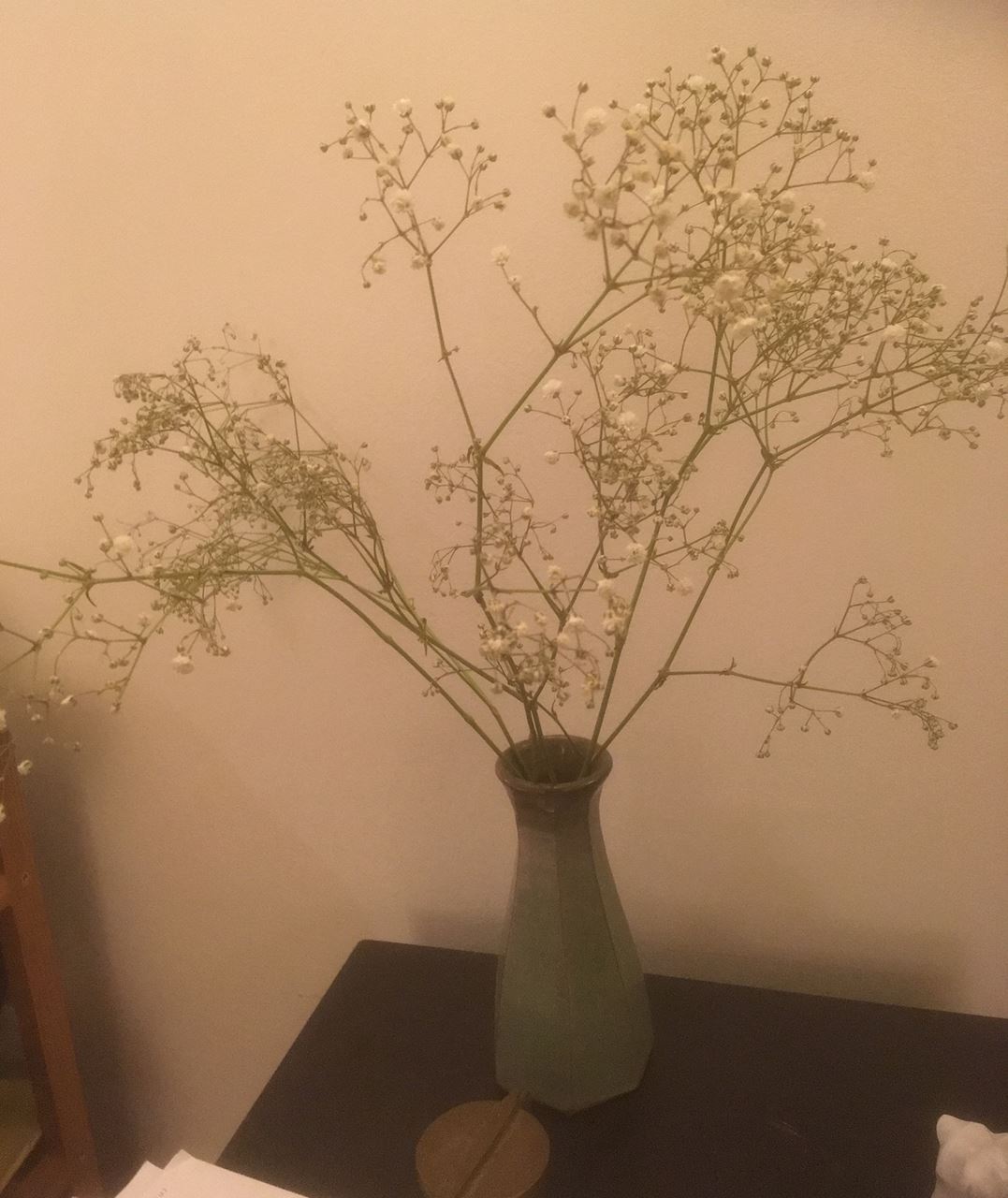 Receiving the award invoked a great feeling of warmth and gratitude that I had been recognised by the community I have worked with and amongst for many years. The effect is still there. Even knowing that I had been nominated made me step to one side mentally to really think about what to do next in addition to running Science Projects, and I resolved to spend more time in the workshop, ‘Noodling about’ was how Paul Orselli put it. My brain was off to a good start with the invention of my ‘photon maker’. This took about ten minutes to think up and involved bending welding rod around some pegs to make a photon like snake. A photon (I might call it a Pizzeytron) can be produced in 20 seconds and with a bit of arm waving they can be used to demonstrate interference, red shift, blue shift, coherent and incoherent light and an E/M wave. It was shown at a rowdy gathering of fellow Science Festival performers in a bar in to great applause.
Receiving the award invoked a great feeling of warmth and gratitude that I had been recognised by the community I have worked with and amongst for many years. The effect is still there. Even knowing that I had been nominated made me step to one side mentally to really think about what to do next in addition to running Science Projects, and I resolved to spend more time in the workshop, ‘Noodling about’ was how Paul Orselli put it. My brain was off to a good start with the invention of my ‘photon maker’. This took about ten minutes to think up and involved bending welding rod around some pegs to make a photon like snake. A photon (I might call it a Pizzeytron) can be produced in 20 seconds and with a bit of arm waving they can be used to demonstrate interference, red shift, blue shift, coherent and incoherent light and an E/M wave. It was shown at a rowdy gathering of fellow Science Festival performers in a bar in to great applause.
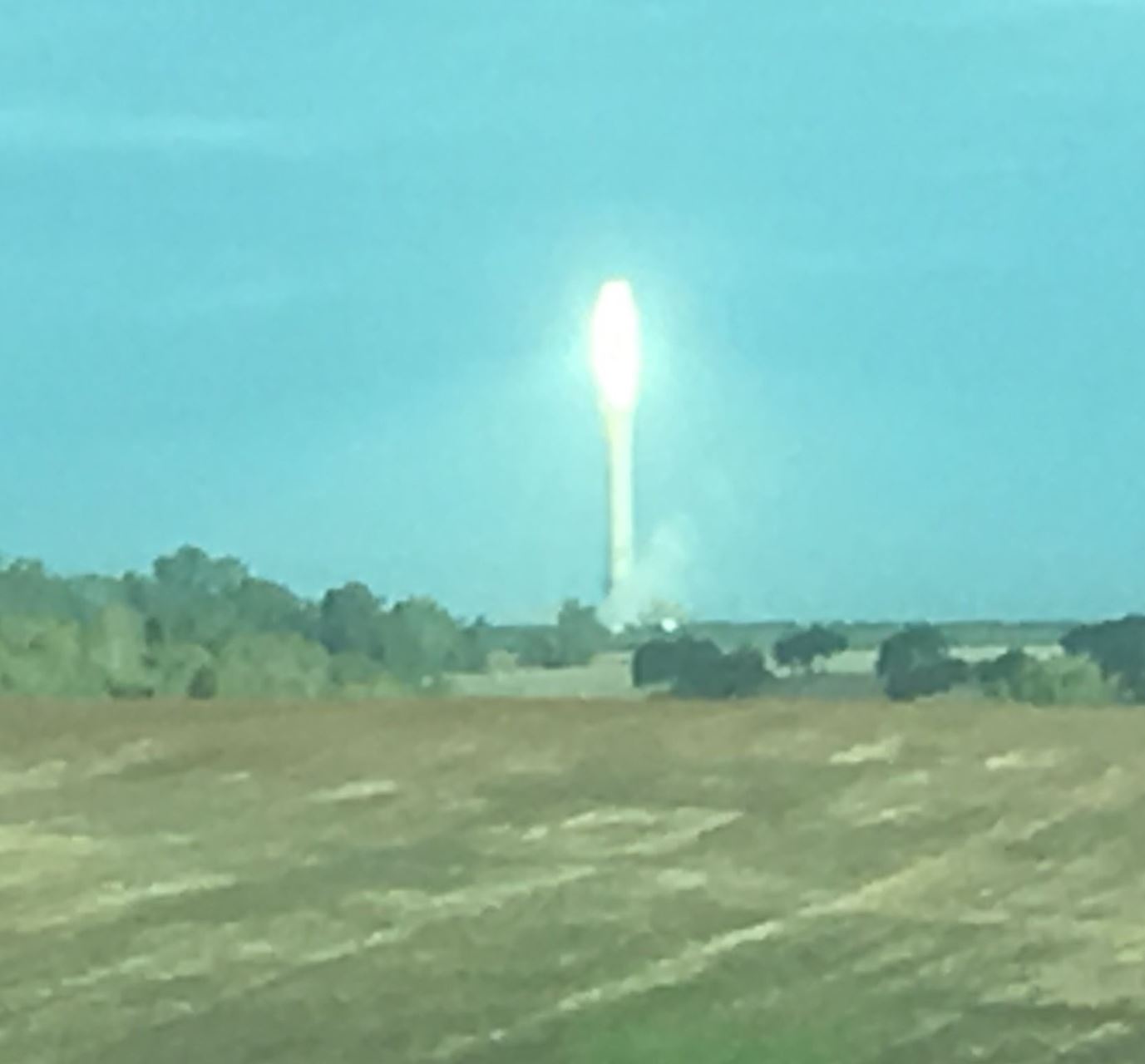 As mentioned in the publicity I am also picking up my interest in ‘Science in The Landscape’ which was the subject of a personal grant from Nesta. This resulted in being invited to organise a conference on theme for the Nordic Science Centres in Iceland and initiate a practical workshop on the streets of Minneapolis/St Paul for ASTC on the theme Science in the urban landscape. I would like to organise another practical workshop or meeting under the banner of the Beetlestone Award. At a recent meeting of the ECSITE space group involving delegates from ESA I thought that there may some opportunity from an Earth resources perspective, I will have a word.
As mentioned in the publicity I am also picking up my interest in ‘Science in The Landscape’ which was the subject of a personal grant from Nesta. This resulted in being invited to organise a conference on theme for the Nordic Science Centres in Iceland and initiate a practical workshop on the streets of Minneapolis/St Paul for ASTC on the theme Science in the urban landscape. I would like to organise another practical workshop or meeting under the banner of the Beetlestone Award. At a recent meeting of the ECSITE space group involving delegates from ESA I thought that there may some opportunity from an Earth resources perspective, I will have a word.
I wish the next Beetlestonian all the pleasure and inspiration that I have received from my award.
Image above - Science in the landscape. Solar power tower spotted on the horizon near Seville.
To find out more about the Beetlestone Award click here